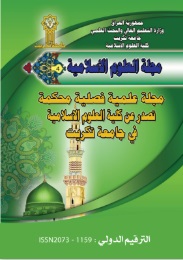Abstract
This study discusses the rulings of ihram and intention according to the views of Imam al-Sharwani as presented in his marginal notes on Tuḥfat al-Muḥtaj. It offers a comparative analysis of the juristic opinions across the major Islamic schools of thought regarding these issues. Chapter One outlines definitions of jurisprudence and its branches, as well as a biographical account of Imam Abd al-Ḥamid al-Sharwani, highlighting his upbringing, teachers, students, major works, and his death. Chapter Two focuses on specific issues concerning iḥram and intention, such as:
The ruling on entering ihram for Hajj before the appointed months. Jurists differ: the majority deem it valid but disliked, while some Malikis and Shafiʿis consider it invalid.
The ruling on a person performing a voluntary Hajj before completing the obligatory Hajj (Hijjat al-Islam). Opinions vary: the Hanafis and Malikis maintain that the intention is valid as made, whereas the Shafiʿis and Hanbalis argue that it defaults to the obligatory Hajj
The research is based on presenting the juristic views with their evidences from the Glorious Qur’an, Sunnah, analogy, and reasoned argument, followed by a comparative evaluation and preference for the strongest view.
The ruling on entering ihram for Hajj before the appointed months. Jurists differ: the majority deem it valid but disliked, while some Malikis and Shafiʿis consider it invalid.
The ruling on a person performing a voluntary Hajj before completing the obligatory Hajj (Hijjat al-Islam). Opinions vary: the Hanafis and Malikis maintain that the intention is valid as made, whereas the Shafiʿis and Hanbalis argue that it defaults to the obligatory Hajj
The research is based on presenting the juristic views with their evidences from the Glorious Qur’an, Sunnah, analogy, and reasoned argument, followed by a comparative evaluation and preference for the strongest view.
Keywords
الأحكام
الإحرام
الشرواني
تحفة المحتاج.
Abstract
يتناول هذا البحث أحكام الإحرام والنية وفقًا لرؤية الإمام الشرواني في حاشيته على تحفة المحتاج، حيث يقدم دراسة مقارنة بين آراء المذاهب الفقهية حول هذه المسائل.
*المبحث الأول: يتضمن تعريف الفقه والفروع الفقهية، بالإضافة إلى التعريف بالإمام عبد الحميد الشرواني، مستعرضًا نشأته، شيوخه، تلاميذه، أبرز مؤلفاته، ووفاته.
*المبحث الثاني: يركز على مسائل تتعلق بالإحرام والنية، ومنها:
1. حكم الإحرام بالحج قبل أشهر الحج: حيث تختلف آراء الفقهاء بين من يراه صحيحًا مع الكراهة (وهو رأي جمهور الفقهاء) ومن يعتبره غير صحيح (كما يذهب بعض المالكية والشافعية).
2. حكم من أحرم بحج تطوع دون أن يؤدي حجة الإسلام: حيث تتباين الآراء بين من يرى أن الإحرام يقع عما نوى (كما يقول الحنفية والمالكية) ومن يعتبره يقع عن حجة الإسلام (كما يذهب الشافعية والحنابلة).
*المنهج المتبع: يعتمد الباحث على عرض الآراء الفقهية مع أدلتها من القرآن والسنة والقياس والمعقول، ثم يقوم بموازنتها وترجيح ما يراه الأكثر قوة.
*المبحث الأول: يتضمن تعريف الفقه والفروع الفقهية، بالإضافة إلى التعريف بالإمام عبد الحميد الشرواني، مستعرضًا نشأته، شيوخه، تلاميذه، أبرز مؤلفاته، ووفاته.
*المبحث الثاني: يركز على مسائل تتعلق بالإحرام والنية، ومنها:
1. حكم الإحرام بالحج قبل أشهر الحج: حيث تختلف آراء الفقهاء بين من يراه صحيحًا مع الكراهة (وهو رأي جمهور الفقهاء) ومن يعتبره غير صحيح (كما يذهب بعض المالكية والشافعية).
2. حكم من أحرم بحج تطوع دون أن يؤدي حجة الإسلام: حيث تتباين الآراء بين من يرى أن الإحرام يقع عما نوى (كما يقول الحنفية والمالكية) ومن يعتبره يقع عن حجة الإسلام (كما يذهب الشافعية والحنابلة).
*المنهج المتبع: يعتمد الباحث على عرض الآراء الفقهية مع أدلتها من القرآن والسنة والقياس والمعقول، ثم يقوم بموازنتها وترجيح ما يراه الأكثر قوة.
Keywords
Ruling - Ihram - Sharwani – Tuhfat Al-Muhtaj
